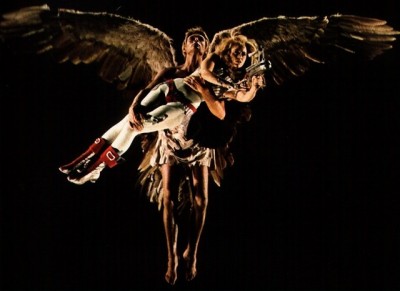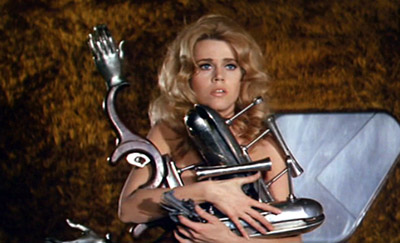The film version of Barbarella gets a semi-bad rap as an over-the-top sex farce with an almost-camp sensibility and a genuinely bad rap as a film either completely disengaged from its own gender politics or completely sexist:
While women strove to clothe their gender with dignity, Barbarella endeavored to strip them of it…Barbarella’s sexual appeal proves to be her most powerful weapon, but she does not control it as much as it controls her. Each episodic dilemma moves to the next by Barbarella’s sexual encounters with alien strangers, at first a pittance she pays them for saving her life. Notably, circumstances leading up to this event strip Barbarella of most of her clothes. The only exception is when she has sex with Duran Duran’s machine, in which her multiple orgasms ruin the device and foil his scheme to kill her. Opening with an erotic scene of Barbarella undressing herself, the film begins with the statement, woman equals sex [Ed.: italics added], for by that point the audience does not know who she is, and spends the remainder of the time underscoring their assertion. [Source here.]
This is a particularly egregious example of feminist critique, but the fact that anybody can seriously advance the notion that a simple striptease is sufficient to denote “woman equals sex” indicates that we may be to the point where we’re so deft with the feminist critique of objectified female bodies that we overlook the ways in which those bodies function not just as oppressive representations of women but as ambivalent representations of cultural dynamics about women. (Not to mention for not-inherently-problematic aesthetic pleasure.)
One of the most striking lines from the film in this context is “The Mathmos has created this bubble to protect itself from your innocence.” The line is spoken by the Great Tyrant, after she and Barbarella are dunked into the ever-hungry Mathmos expecting to die, only to find themselves protected by a spontaneously generated enclosure that looks a little like the Jetsons’ car (I failed to find a decent picture online.) Delivered in the film’s final minutes, after Barbarella has eagerly rewarded three rescuers with sex and survived the Orgasmotron, the line encapsulates the film’s characteristically 1960s’ stance on the inherent goodness of sexual pleasure. Like much popular culture from the era, Barbarella works to recast the traditional, Puritanical distinction between innocence and corruption, making “purity of body” almost entirely inoperative and advancing the idea that the “good-hearted” (male and female) enjoy sex too.
This is not “woman equals sex.” This is “sex is really, really, fun but mostly irrelevant.”
As an artifact of sexual liberation, Barbarella is certainly subject to the more-limited feminist critique that the sexually liberated woman is a male wish fulfillment, but in the world of the film, Earth culture has evolved to a future state where the Hippie premises are simply business as usual and the power dynamics that inform them in the present have evaporated. Sex is casual; pleasure is paramount; goodness is manifest; and power is besides the point. The other stereotypical Hippie assumption, that mind-altering drugs are benign and progressive, has a surprisingly ambivalent status: on Earth, a drug that allows for the “rapport” of minds has replaced physical intercourse. Although the film doesn’t strongly disparage the use of the drug, it definitely depicts physical sex as both more “primitive” and better.
Thematically, Barbarella’s fantasmic sexual receptiveness is a function of that “primitive goodness” – the merging of physical sensuality with a nurturing and anti-violent sensibility – a concept not entirely unrelated to the later feminist concept of “woman’s wisdom.” The fantasy extends significantly beyond access to the desirable female body, and the film’s politics – sexual and otherwise – are consequently more complex. The critique of Barbarella as brute objectifiation is one of those reductive arguments deriving from an adherence-to rather than an awareness-of the contemporaneous feminist dictum that the personal is political, and it misses the extent to which there’s a lot of politics in this film that has nothing to do with Barbarella’s breasts.
Countercultural exoticism, in both its erotic and philosophical modes, often reflected the influence of the “Hippie trail” – the search for enlightenment in the uncorrupted cultures of the East, viewed as more primitive, authentic, or “in touch” with nature. This affection for primitive eroticism drives the film’s motifs, although the space-exotic aesthetic owes more to the curvy “woggles” of Morris Lapidus than to primitive art or the ethnic tapestries of the subcontinent so characteristic of more earthbound 60s mythologies. Barbarella’s primitivism takes a particularly Western formulation: She is Eve in the Garden of Eden before the Fall: a helpmeet and sexual partner to man, but “innocent” and “pure,” uncorrupted of spirit, naïve about the ways in which her sexuality is both powerful and political.
Released in 1968, the year of the Battle of Saigon and the My Lai massacre, the movie is also ambivalent about violence: the opening sequence, in which the President of Earth sends Barbarella to locate and stop Durand Durand from an as-yet-unknown nefarious plan, establishes that “the Universe has been pacified for centuries.” When the (completely nude) Barbarella receives weapons to help her in the mission she campily complains about being “armed like a naked savage.”
Societies with a propensity to war are described as “in a primitive state of neurotic irresponsibility.” Without even a hint of contradiction, primitive violence is every bit as bad as primitive eroticism is good. Make love, not war.
Aesthetically, the film is a shaky and rollicking hybrid of this hippie utopia with space age bachelor fantasy: Barbarella is beautiful, strong, available for sex at the drop of an innuendo, handy with gadgets, and pacificist, but a perfect shot, able to destroy aircraft from an entirely unbelievable distance with merely a handgun. The world she inhabits is fashionable, uninhibited, and full of stylized villians who are easily defeated.
But perhaps the most illuminating element of the hybrid lies in the residue of domesticity. Barbarella does not keep house; she does not cook; she is not waiting around for the men she sleeps with to take care of her or provide for her. She is a “five-star, double-rated astronavigatrix” with her own spaceship who gets direct calls from the President of Earth. She is also immensely kind, consistently nurturing, and completely not manipulative in any way. This is surely male fantasy, but it is not the oppressive “barefoot and pregnant” male fantasy of first wave feminism or even the “hang around the Mansion and look gorgeous” fantasy of Hugh Hefner. If Barbarella dressed in a smart polyester pantsuit and unzipped it less frequently she would be as unobjectionable as Mary Tyler Moore.
Watch this spot for a link to part 2.


